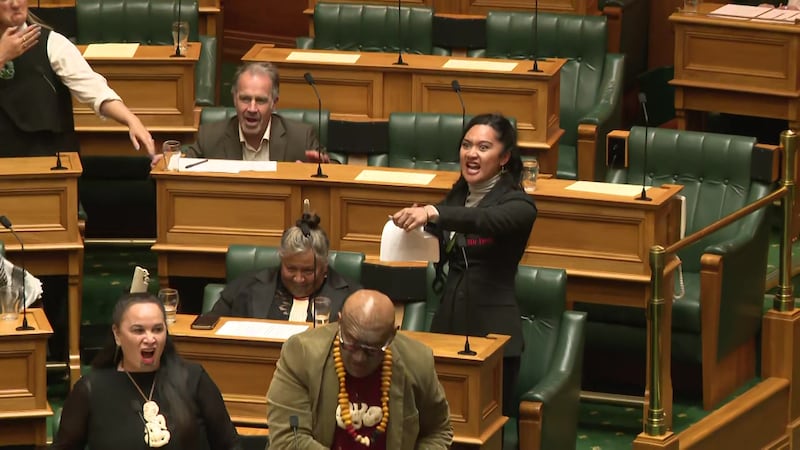This article was first published by Stuff.
The Māori electoral roll has grown by nearly 1800 people in three weeks, a boost Te Pāti Māori co-leader Rawiri Waititi is linking to the landmark hīkoi mō te Tiriti protest which finished in record numbers at Parliament on Tuesday.
According to the electoral commission, 1309 people switched from the general roll to the Māori roll in November, up from 59 in October, while 487 people enrolled for the first time on the Māori roll. Seventeen people changed from the Māori roll to the general roll, down from 23 last month. All up, it equates to 1779 more people on the Māori roll.
It dwarfs growth on the general roll - which had 25 new enrolments this month, and in October, and comes just days after crowds at the hīkoi surged to an estimated 42,000 in central Wellington, where the nine-day march ended.
The march was formed in protest to government policies effecting Māori, particularly the controversial Treaty Principles Bill, which seeks to reinterpret the Treaty of Waitangi and legislation that upholds Māori rights.
Hana-Rawhiti Maipi-Clarke, who became super-viral last week when she led a haka in the House, asked for “every single Māori person” in the crowd to take their phone out and register to vote on Māori roll.

Rawiri said the message sent on the hīkoi - which was organised by Eru Kapa-Kingi who works for party - was for Māori to use their collective democratic power to gain self-determination.
“To achieve this, we need to enrol and enrol onto the Māori roll. More voters on the Māori roll, more Māori electorates, more Māori representation,” he said.
“We will continue to share that message, particularly at the start of the new year across Waitangi and at Rātana.”
Hīkoi and political action
Waititi said it was important for the party that collective unity seen in the hīkoi translated into political action “not only against the treaty principles bill but for the future and for the Aotearoa our mokopuna deserve to inherit”.
The bill, supported by ACT leader David Seymour, is expected to fail at its next vote in mid-2025, but critics - including the Opposition - fear it will incite racism and division while it goes through the six month select committee process, where members of the public can make submissions.
National MPs, including Prime Minister Christopher Luxon, have said it is “unhelpful” and “divisive”.
Professor Alexander Gillespie, from Waikato University, said it was likely the increased political engagement was related to the Treaty Principles Bill and other laws which effect Māori rights.
Increased political engagement on the issue was only positive, he added, especially when democracies overseas were suffering with people becoming disengaged from politics.
Māori roll or general roll
People can move between rolls to vote strategically.
Those on the Māori roll vote in one of seven Māori electorates. They also have a party vote. Political parties gain seats by winning electorates, and based on its share of the party vote.
Voters supporting Te Pāti Māori, for example, may want to move to the Māori roll to ensure the party’s candidate wins a Māori electorate seat.
Not every political party puts up a candidate in the Māori electorates.
National put up candidates for just two seats - Te Tai Hauāuru and Tāmaki Makaurau - in the 2023 election. It was the first time it had fielded candidates in the Māori seats for more than two decades, but it lost both of them.
Te Pāti Māori won six of the seven seats, taking most seats from Labour, except for Ikaroa-Rawhiti which newcomer Cushla Tangaere-Manuel won over Meka Whaitiri.
Under electoral rules, which were amended last year, anyone with Māori whakapapa can switch between rolls until three months before an election.
“It is our hope with such movement in terms of Māori getting on the Māori roll, that additional Māori seats will be established, that we win Ikāroa-Rāwhiti and stand strong candidates in any additional Māori electorates created. That is the silver lining,” Waititi said.
More Māori seats
Further growth on the Māori roll could also lead to more seats in the House - but that won’t be clear until after the next census, due in 2028, so won’t effect the 2026 election.
Stats NZ last month looked at the number of electorates and the electoral population, including for Māori seats, using data from the census.
If trends continue, a spokesperson said, the number of Māori electoral districts could increase to eight after the next census, which would fall before the 2029 general election.
More than 500,000 of the voting population are Māori.
- Stuff


